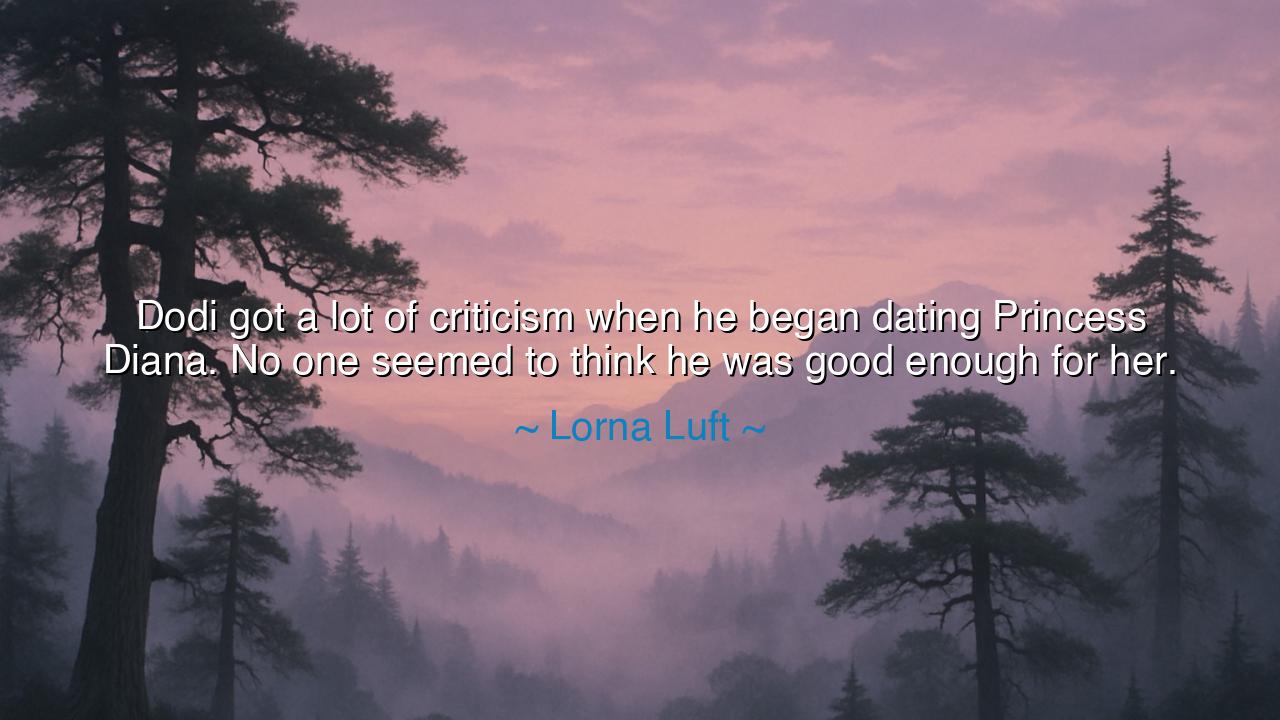
Dodi got a lot of criticism when he began dating Princess Diana.
Dodi got a lot of criticism when he began dating Princess Diana. No one seemed to think he was good enough for her.






In the poignant words of Lorna Luft, we hear a reflection that transcends the lives of the famous and touches upon one of the oldest struggles of the human heart: “Dodi got a lot of criticism when he began dating Princess Diana. No one seemed to think he was good enough for her.”* Beneath this statement lies the ancient tension between love and judgment, between the heart’s freedom and the world’s gaze. For in every age, those who love boldly must face the scrutiny of others — the murmurs of society that weigh worth not by spirit, but by status, reputation, and perception. Luft’s words, though spoken of two luminous figures of our time, echo the same story that has unfolded in the courts of kings and the cottages of the poor alike: that love, when it dares to cross boundaries, is always tested.
The relationship between Dodi Fayed and Princess Diana was more than a union of two people; it was a collision of worlds. She, the beloved symbol of grace and compassion, the “People’s Princess,” still wounded from the brokenness of royal life. He, the son of great wealth and ambition, yet burdened by whispers that questioned his worthiness. To the public, their love seemed unbalanced — as if one shone too brightly for the other. And so the chorus of criticism rose, fueled by envy, misunderstanding, and the human tendency to measure love by appearance rather than truth. Luft’s observation captures not just gossip, but the deeper injustice of judgment — the blindness that refuses to see the sacred equality between two souls who find solace in each other’s company.
This pattern is not new. In the annals of history, we find countless lovers condemned not for the nature of their love, but for who they were. The story of Antony and Cleopatra, too, was one of scandal. The Roman world looked upon their union with suspicion and disdain — the great general of Rome, captured, they said, by the “witchcraft” of an Eastern queen. Yet their love burned so fiercely that it defied empire itself, outlasting armies, surviving in legend. Society judged them, history remembered them, but their hearts knew only the truth of their bond. So it was, too, with Dodi and Diana — love finding its brief moment of light amid the shadow of public scorn.
The origin of Luft’s quote lies not only in recounting a tragedy, but in expressing the timeless sorrow of seeing love misunderstood. Lorna Luft, herself the daughter of the great Judy Garland — another soul who lived under the weight of fame and scrutiny — spoke from a place of empathy. She knew what it was to be judged by the world’s standards, to have one’s private life made a public mirror for others’ opinions. Her remark is not gossip, but compassion — a defense of the heart’s right to choose without permission. By saying, “no one seemed to think he was good enough for her,” she exposes the arrogance of a society that claims authority over the mysteries of love.
The truth is that no human being can measure the worthiness of another in love. The world looks to wealth, title, and reputation; but the heart looks to kindness, understanding, and peace. In this, the critics of Dodi and Diana failed to see what they most needed: that two wounded souls had found a measure of comfort in each other’s presence. The “good enough” they sought to define was an illusion, for love is not a competition of merit, but a surrender of spirit. And in the short time they shared before fate’s cruel hand struck them both, they lived something genuine — a bond unguarded by protocol, untamed by public opinion.
Throughout time, those who love outside of expectation have paid a price. The poet Sappho, whose songs of passion scandalized her own island, wrote that love is “a fire that burns the heart and the tongue alike.” Yet she did not stop singing. Nor did Diana, who lived with courage and tenderness despite the judgment of the world. Luft’s words remind us that love’s greatest test is not distance or difference, but the courage to love despite the noise — to choose connection over conformity, authenticity over approval.
Let this be the lesson: never let the world decide who is worthy of your love. The opinions of others are fleeting; the truth of the heart endures. Love is not a performance for the crowd, but a covenant between souls. To judge love by social measure is to blind oneself to its miracle. The wise know that the worth of a person is not in title or wealth, but in the light they bring to another’s life.
Action to take: the next time you find yourself or others judging the union of two hearts, pause and remember Dodi and Diana — two human beings who sought, if only for a moment, refuge from loneliness in each other’s arms. Honor love wherever you find it. Defend it from cynicism. For as Lorna Luft teaches, the world may forever question who is “good enough,” but love, in its purity, asks only one question: “Do we see each other truly?” And in that seeing — brief or eternal — there lies the holiness of being human.






AAdministratorAdministrator
Welcome, honored guests. Please leave a comment, we will respond soon